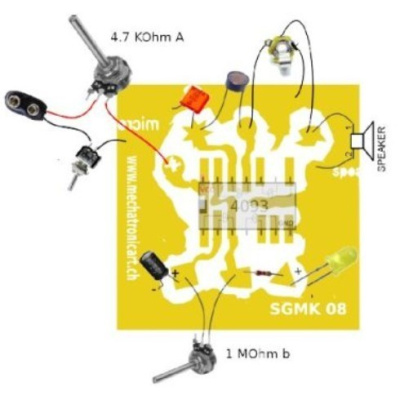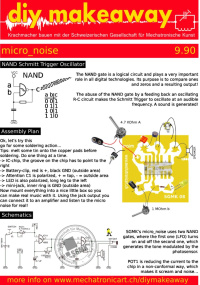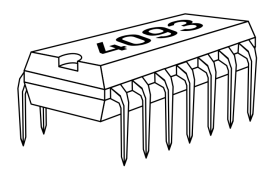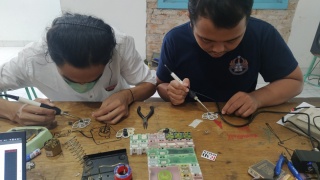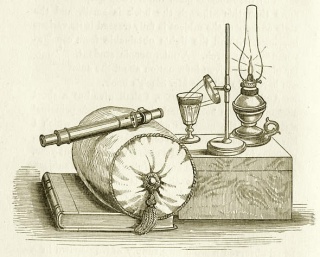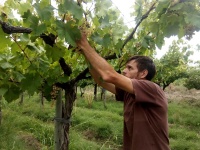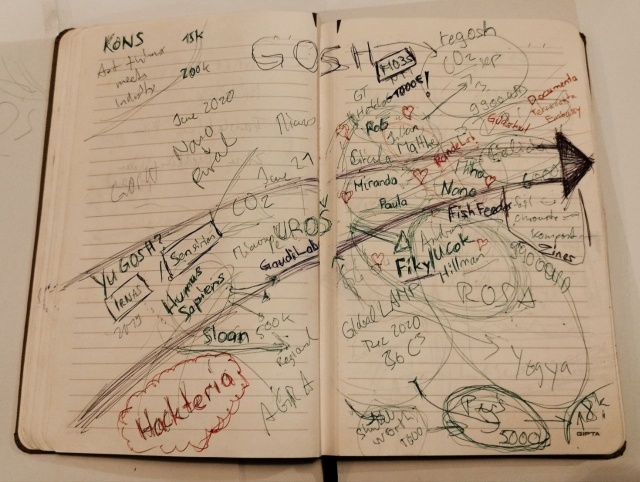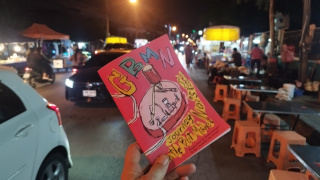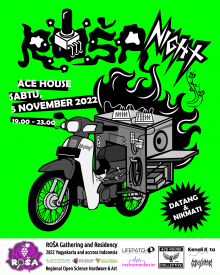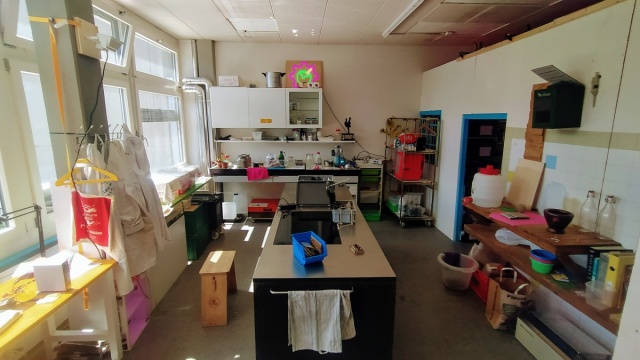LatamTrip24
Contents
- 1 dusjagr's research / networking trip to Latin America (Argentina, Chile, and let's see where i gonna end up)
- 2 Partners
- 3 Earlier Collaborative Works and Gatherings
- 3.1 HackteriaLab 2014 - Yogyakarta
- 3.2 Klöntal Biohack Retreat - Switzerland 2017
- 3.3 GOSH - Gathering for Open Science Hardware
- 3.4 UROŠ - Ubiquitous Rural Open Science Hardware
- 3.5 GBMN - Sanft, aber macht Lärm
- 3.6 ROŠA - Regional Open Science Hardware & Art, Indonesia
- 3.7 Hackteria ZET - Open Science Lab, Zurich, Switzerland
- 3.8 Hacker-in-Residence Programme @ SGMK and Hackteria ZET, Zürich, Switzerland
- 3.9 SGMK's HOME MADE Summercamps alive and kicking since 2005
dusjagr's research / networking trip to Latin America (Argentina, Chile, and let's see where i gonna end up)
What is it about?
dusjagr goes for a research trip to deepen his existing collaborations in Argentina and beyond, extend the global hackteria network, explore and find new interesting intitiatives, and prepare and research on "Why Do We Gather?" in the outlook of the upcoming Gathering for Open Science Hardware (GOSH) to be held in May 2025 in Indonesia. Personal focus on DIY workshop methodologies, bioart, art&science in general, sound and synth making communities, and open to surprise encounters.
See my notes on possible encounters and collaborations.
Thanks to the support by Pro Helvetia for the research trip
Hopefully we can aim at longer term collaborations? Continuing newly established collaborations through the Co-Creation grant
Link to original application materials to Pro Helvetia (research trip, 6k CHF for 30 days) "DIY Ciencias, Artes y Suelos Electrónicas"
Topics of interests go towards:
- Art & Science: find interesting local initiatives. BioArt, add new people to forum and hackteria network
- Environmental sensors, activism and open source culture
- Media Arts: What practices and artists are around?
- GOSH: finding interesting hybrid practitioners working with and on Open Science Hardware
- DIY & Synth maker communities, that work creatively and with the arts
- Meet curators and practitioners
- General overview of the spectrum in art scenes and it's workings
Activities planned and in the making
Land and Welcome to Buenos Aires, 23 - 27 abril
Taller de Recursos Educativos Abiertos - Mendoza, 29 abril - 3 de mayo
See notes on this gdoc
Link to the event in Mendoza
Some interesting links to stuff that was presented:
Discussions and Reflections on "Why Do We Gather?"
Started a discussion on the GOSH forum about it.
"Coming together is a beginning,
Keeping together is progress,
Working together is success."
Visit Santiago de Chile
Departure from Buenos Aires, 12. June
About dusjagr
Marc Dusseiller aka dusjagr (Switzerland)
Marc Dusseiller aka dusjagr is a nomadic researcher and workshopologist. He is part of the Center for Alternative Coconut Research, co-founder of SGMK, Bitwäscherei Hackerspace Collective and the Hackteria network. Before travelling the world for making DIY / DIWO laboratories for creative biological experimentation with living media, Marc entered the world of DIY electronics, designing printed circuit boards for synthesizers and organizing workshops and festivals mostly in Zürich, Taipei and Yogyakarta. He was the co-organizer of the different editions of HackteriaLab 2010 - 2020 Zürich, Romainmotier, Bangalore, Yogyakarta and Klöntal, Okinawa and collaborated on the organisation of the BioFabbing Convergence, 2017, in Geneva and the Gathering for Open Science Hardware, GOSH! 2016, Geneva & 2018, in Shenzhen. He also loves coconuts.
- http://hackteria.org/wiki/dusjagr
- https://mechatronicart.ch/
- https://bitwaescherei.ch/
- https://wiki.8bitmixtape.cc/
Marc Dusseiller alias dusjagr es un investigador y tallerista nómada. Es parte del Center for Alternative Coconut Research, co-fundador de SGMK, Bitwäscherei Hackerspace Collective y la red Hackteria. Antes de viajar por el mundo para crear laboratorios DIY/DIWO para la experimentación biológica creativa con medios vivos, Marc entró en el mundo de la electrónica DIY, diseñando placas de circuito impreso para sintetizadores y organizando talleres y festivales principalmente en Zürich, Taipei y Yogyakarta. Fue coorganizador de las diferentes ediciones de HackteriaLab 2010 - 2020 Zürich, Romainmotier, Bangalore, Yogyakarta y Klöntal, Okinawa y colaboró en la organización de BioFabbing Convergence, 2017, en Ginebra y el Gathering for Open Science Hardware, GOSH! 2016, Geneva & 2018, in Shenzhen. También le encantan los cocos.
Possible Workshops
Make Your Own Synthesizer Noisy Toy
Turn on your soldering irons!
We will build a simple do-it-yourself synthesizer, based on the "classic" µ-Noise circuit by SGMK, made since 2008 thousands of times all over the world! Only with a few electronic components, resistors, IC, potentiometer, light sensors, we will solder the little noisy toy and jam together. We will guide you into "how to solder", describe and explain the circuit, make electronic music with square wave oscillators and LFO. All particpants will make their own synth and can take it home!
Bling Bling Pips - Gambar Pisibi-mu Sendiri
Based on the creative and collaborative design workshops held accross the globe since 2017, participants developed various PCB designs for open hardware electronic circuits, such as the peepsy, a simple CONTINUITY TESTER based on David Johnson-Davies' design.
The peepsy circuit is based on the ATTINY85 functions as a continuity tester, the famouse "peeps" of every multimeter, that allows you to test if an electric connection is present, testing your aux cables, or debbugging other electronics. And it has a pink LED on it!
MicroMikroMakro Magnify Everything
How can we observe life beyond the capacity of our human eyes?
Work with DIY microscopy includes converting an ordinary webcam into a microscope. The webcam’s conversion can be quickly effected manually. The electronics remains unaltered, only the position of the lens is changed. A solid platform enables fixing and accurately focusing the tiny study objects. The objects are illuminated with a light-emitting diode (LED).
Even more simple magnifications / microscopes can also be built using your smart phone camera and attached a cheap plastic lens! See examples of the Mobile Phone Field Microscope.
View the instructions here: https://mega.hackteria.org/index.php/s/gWnxQRxc2QkQp2a
Stories from the Hackteria Zines Library
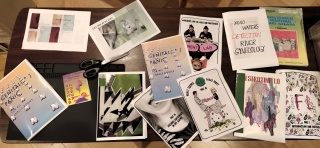
“Oh GOSH! Reflecting on Hackteria's Collaborative Practices in a Global Do-It-With-Others Context”
DIY Laboratory Equipment by Hackteria
Coconut-Research and PCB making Yogya
Partners
Fernando “Nano” Castro (Mendoza, Argentina)
Fernando “Nano” Castro is a digital artisan from Mendoza (Argentina) working at the interface between scientific/tech communities and local communities that need to improve production practices or monitor the environment. Partner of Coop Ayllú, a cooperative that manages a small farm to produce food and beverages. Nano has given several open source scientific tools workshops as a facilitator in Chile and Argentina. Currently working on establishing an Open Agroecology Lab for soil and food research. Member of Latam network of free scientific technologies reGOSH.
Laura Olalde (Buenos Aires, Argentina)
Laura Olalde is a visual artist and educator working in the intersection across Art, Science and Technology. With a background in Fine Arts, in painting specialization, some years ago Laura incorporated living matter processes in her artistic practice. Since 2013 Laura is part of PROTEUS, a sci-art collective formed with molecular biologists and social scientists. In 2017, Laura joined the Global Community Bio Summit and also got involved with the Global Open Science Hardware (GOSH) community, as a key movement for an equitable access towards scientific research, communitarian science and constructive learning processes across disciplines. Laura lives and works currently in Buenos Aires, Argentina.
Fernan Federici (Santiago de Chile, Chile)
Ariel Charec (Buenos Aires, Argentina)
Buenos Aires-based cultural connector with more than a decade of experience working in the intersection of art, music and technology.
As the former General and Artistic Producer of MUTEK festival in Argentina and after being involved in many independent cultural projects, I've built strong links with artists, practitioners, institutions, and with a wide range of strategic partners.
He is currently the Programme Manager of Pro Helvetia South America responsible for Argentina, Paraguay and Urugay.
Support
Earlier Collaborative Works and Gatherings
HackteriaLab 2014 - Yogyakarta
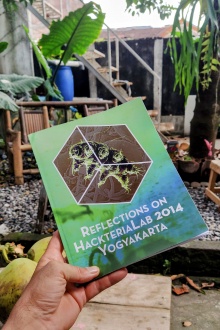
Watch the full movie / documentary: "SENI GOTONG ROYONG: HackteriaLab 2014 - Yogyakarta"
Citizen science has long contributed to the health of local communities by making people aware of their environment in the form of oral histories and traditional wisdom. Recently, international open source and maker movements have been actively engaging with the life sciences to focus on the environment. This brought a revival of the tradional knowledge as well as an opportunity for innovation and a model for public participation in science. These activities are becoming influential policy forces changing how we produce and share knowledge as an iterative and collective process. Yogyakarta, Indonesia, has been one of the most active hubs in this movement.
HackteriaLab 2014 – Yogyakarta was held in April 2014 as a two-weeks making-oriented gathering of researchers, artists, scientists, academicians, hackers and whatevers in Yogyakarta. It expanded on ideas and methodologies about BioArt, DIY biology, DIWO (Do-It-With-Others), appropriate technology, art and science, and biohacking, developed during the previous versions of HLab10 - Dock18, HLab11 - Romainmotier both in Switzerland and HLab13 - Bangalore, India. HLab14 was hosted by LIFEPATCH - citizen initiative in art, science and technology and co-organized together with HACKTERIA | Open Source Biological Art in collaboration with various regional partners.
This book tried to assemble a collection of essays written by the participants, asked to reflect on their own experiences, individually or collectively, which only gives a glimpse into all the projects and exchanges that happend during HLab14. With a short overview of the programme and activities, selected photo impressions and the exhibition manual the book is rounded up and can be an entry point to explore further our online resources and serve as an inspiration for transdisciplinary collaborative practices.
Find all info about the HLab14-Book"Reflections on HackteriaLab 2014 - Yogyakarta"
Klöntal Biohack Retreat - Switzerland 2017
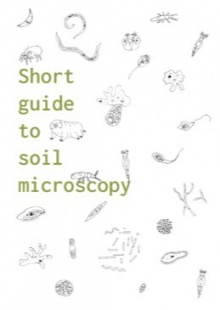
Klöntal Biohack Retreat - Switzerland 2017 - 5 days of Biohacking and Art im Klöntal - The artist Maya Minder, in collaboration with Hackteria.org, invited people from the international Biohackerscene to stay in the Klöntal. Natural scientists, hackers and artists meet for the development of ideas and open exchange.
Also known as HackteriaLab 2017 - Klöntal, which then lead to a series of events in the Region of Switzerland and Southern Germany under the umbrella of HUMUS sapiens, starting in Sring 2018 and still kicking...
GOSH - Gathering for Open Science Hardware
From microscopes to microfluidics and water quality test equipment, hardware is a vital part of science. Advances in instrumentation have been central to scientific revolutions and access to hardware shapes the work of communities conducting research globally on a daily basis. However, the current supply chain for science hardware limits access for many groups of people and impedes creativity and customisation. Open Science Hardware (OScH) means sharing designs for scientific hardware openly online that anyone is freely able to use, modify and even commercialize. This approach could drastically reduce the costs of research while enabling people to collaborate and learn in new ways.
The Global Open Science Hardware community supports OScH by convening meetings such as the Gathering for Open Science Hardware (GOSH), publications, activities and providing a forum for the community.
See more on GOSH website and join the forum to discuss!
Together we will make Open Science Hardware ubiquitous by 2025 and build new futures for science.
GOSH 2018 Shenzhen
UROŠ - Ubiquitous Rural Open Science Hardware
August 2021 - Jan 2023, Maribor, Slovenia and globally connected
GBMN - Sanft, aber macht Lärm
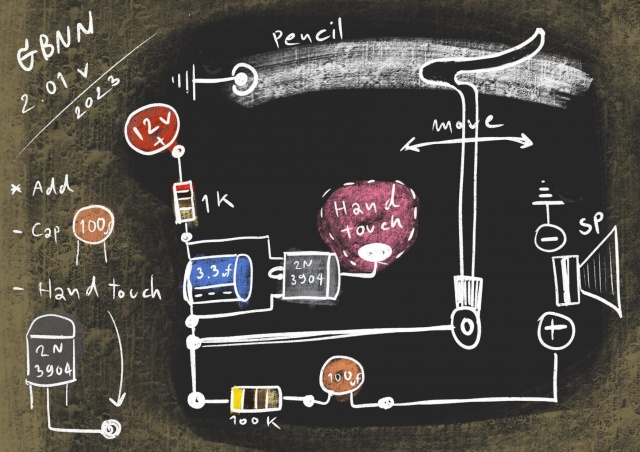
Revised English version "GBMN workshop journey" Zine
https://mega.hackteria.org/index.php/s/6esFrkW3aDkJCTZ
This booklet describes a journey of learning from each other’s workshop methodologies with a specific example of “GBMN – Gentle But Make Noise”, a creative sound and electronics workshop, developed by Arnont Nongyao and reproduced and reflected upon by Marc Dusseiller.
Gentle But Make Noise (GBMN) journey (GBMN workshop journey by Arnont & Marc). This is an experimental sound workshop about “How to make a simple noise generator by pencil drawing or LDR sensor and a simple electronic circuit on the local materials”, participants found local objects (plastic bottles, wood, paper, etc) and made simple noise generators on the objects as unique instruments. After that we are playing GBMN together.
ROŠA - Regional Open Science Hardware & Art, Indonesia

As a continuation of various research and network activities within UROŠ - Ubiquitous Rural Open Science Hardware, we are happy to announce to have received the GOSH regional events grant (9900 USD, supported via Sloan Foundation) for more activities in Indonesia during 2022, under the name "ROŠA - Regional Open Science Hardware & Art". See the original application here and our planning budget.
"A regional event series combining a longer on-site residency, aswell as a research & production lab, local outreach and a gathering of interesting players from the region of South East Asia."
Hackteria ZET - Open Science Lab, Zurich, Switzerland
Since summer 2020 we have initiated a new local programme in Switzerland under the name «Hackteria – Zentrum für Experimentelle Transdisziplinarität» and we proudly started a new space, as part of Bitwäscherei shared hackerspace collective, with dedicated facilities for the «Open Science Lab».
A laboratory, a social learning space, a place of work and research, a transdisciplinary meeting point for designers, hackers, artist, foodies and fermentation activitists.
- some limited info on the wiki about the OpenScienceLab
- https://www.hackteria.org/projects/news/hackteria-zet-open-science-lab-in-zurich/
Hacker-in-Residence Programme @ SGMK and Hackteria ZET, Zürich, Switzerland
The Hacker-in-Residence Programme is jointly organized by various people from the environment of Bitwäscherei, and directed primarily by Marc Dusseiller aka dusjagr, Center for Alternative Coconut Research, in his role as as co-founder and board member of both the Swiss Mechatronic Art Society and Global Ambassador of the Hackteria Network.
SGMK's HOME MADE Summercamps alive and kicking since 2005










